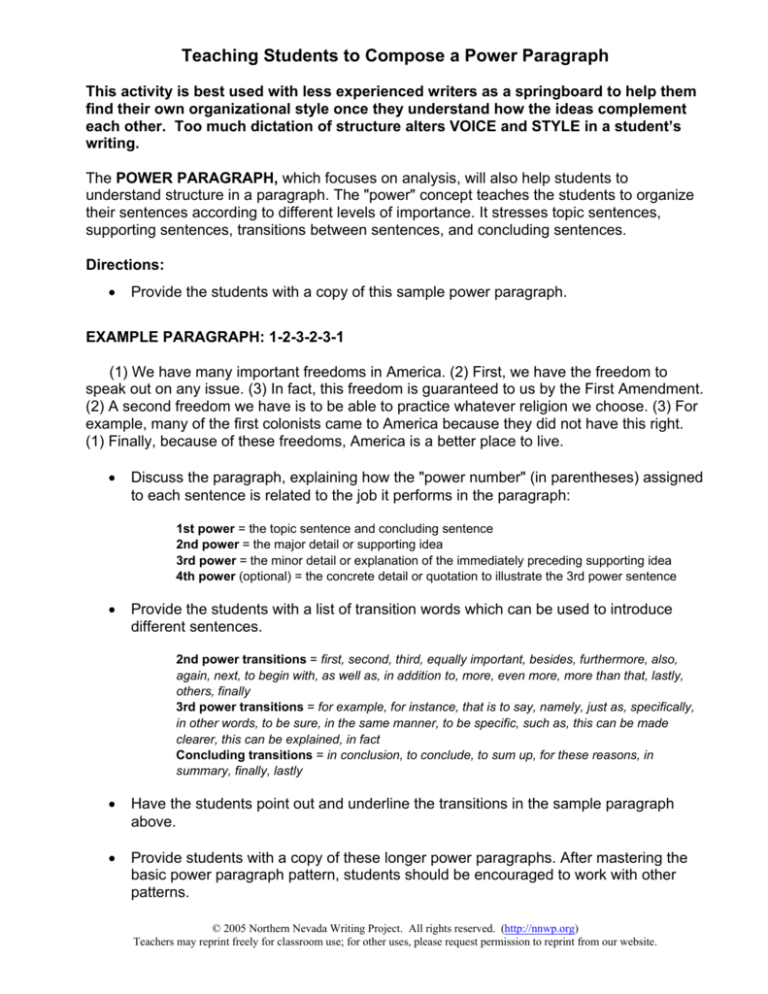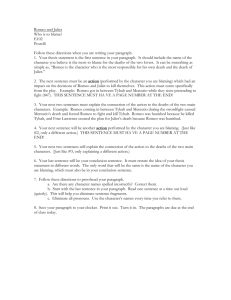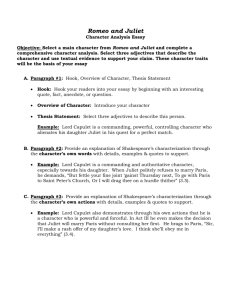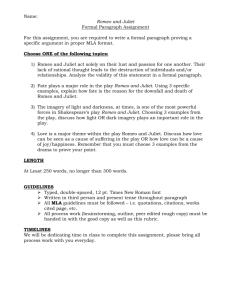
Teaching Students to Compose a Power Paragraph
This activity is best used with less experienced writers as a springboard to help them
find their own organizational style once they understand how the ideas complement
each other. Too much dictation of structure alters VOICE and STYLE in a student’s
writing.
The POWER PARAGRAPH, which focuses on analysis, will also help students to
understand structure in a paragraph. The "power" concept teaches the students to organize
their sentences according to different levels of importance. It stresses topic sentences,
supporting sentences, transitions between sentences, and concluding sentences.
Directions:
•
Provide the students with a copy of this sample power paragraph.
EXAMPLE PARAGRAPH: 1-2-3-2-3-1
(1) We have many important freedoms in America. (2) First, we have the freedom to
speak out on any issue. (3) In fact, this freedom is guaranteed to us by the First Amendment.
(2) A second freedom we have is to be able to practice whatever religion we choose. (3) For
example, many of the first colonists came to America because they did not have this right.
(1) Finally, because of these freedoms, America is a better place to live.
•
Discuss the paragraph, explaining how the "power number" (in parentheses) assigned
to each sentence is related to the job it performs in the paragraph:
1st power = the topic sentence and concluding sentence
2nd power = the major detail or supporting idea
3rd power = the minor detail or explanation of the immediately preceding supporting idea
4th power (optional) = the concrete detail or quotation to illustrate the 3rd power sentence
•
Provide the students with a list of transition words which can be used to introduce
different sentences.
2nd power transitions = first, second, third, equally important, besides, furthermore, also,
again, next, to begin with, as well as, in addition to, more, even more, more than that, lastly,
others, finally
3rd power transitions = for example, for instance, that is to say, namely, just as, specifically,
in other words, to be sure, in the same manner, to be specific, such as, this can be made
clearer, this can be explained, in fact
Concluding transitions = in conclusion, to conclude, to sum up, for these reasons, in
summary, finally, lastly
•
Have the students point out and underline the transitions in the sample paragraph
above.
•
Provide students with a copy of these longer power paragraphs. After mastering the
basic power paragraph pattern, students should be encouraged to work with other
patterns.
© 2005 Northern Nevada Writing Project. All rights reserved. (http://nnwp.org)
Teachers may reprint freely for classroom use; for other uses, please request permission to reprint from our website.
Next, have students analyze these two student samples in pairs or in small groups.
Have your students discuss the reasons for each sentence’s assigned power. Do
they agree with the number assigned and why?
Student sample A: 1-2-3-4-2-3-2-3-4-2-3-1
(1) In the novel To Kill a Mockingbird by Harper Lee, prejudice is a major theme. (2) First,
one's family background is a basis for prejudice in Maycomb, the town where the story takes
place. (3) The townsfolk of Maycomb tend to judge people by their last names, thinking all
people that share common ancestry are the same. (4) For example, Aunt Alexandra is
always judging people by their last names: The Ewell family are all trash, and the
Cunninghams will not accept welfare. (2) Second, women are subject to prejudice. (3) That
is to say that women are not allowed to serve on juries. (2) Third, black-white prejudice is
very common in Maycomb. (3) For example, when Jem and Scout, two white children, go to
a Negro church, they are snubbed. (4) Lulu, a black lady, says about Jem and Scout, "They
got their own church," meaning what are these white children doing in our territory. (2) Above
all, the people of Maycomb are prejudiced against the unknown. (3) Namely, the ladies of
Maycomb are disgusted with the Mruna Africans' lifestyle, but never did it occur to them that
they themselves are imperfect. (1) In conclusion, the citizens of Maycomb are prejudiced
against what they don't understand.
--Brian H., high school writer
________________________________________________________________________
Student sample B: 1-2-3-3-3-2-3-1
(1) One of my favorite leisure activities is meditating in the dog run. (2) For one thing,
doing this makes me feel simple-minded and unaffected by daily pressures. (3) I can run my
fingers through the air, making pictures of the sun or a smiling face. (3) Sometimes I can
even twirl the shedded dog hair around and around my finger, like a wedding band. (3) And,
while I'm doing these things, there's no teacher yelling at me and no big brother screaming
for me to clean his room. (2) Sitting in the dog run also makes me feel powerful. (3) If I have
the impulse, I can even lock the dog out of the run. (1) For both reasons, I always enjoy
spending a day in the dog run.
-Marie O., eighth grade writer
© 2005 Northern Nevada Writing Project. All rights reserved. (http://nnwp.org)
Teachers may reprint freely for classroom use; for other uses, please request permission to reprint from our website.
Next, hand out the unlabeled Power Paragraphs on this page and the next to all students.
Ask students to first individually label each sentence with the appropriate number, then to
discuss their answers with partners.
Student sample 1:
( ) My brother is the laziest person I know. ( ) First, when he goes into the kitchen to
get something to eat, you can bet you'll have a whole day's work to do when he gets out.
( ) He will fix himself a peanut butter and jelly sandwich, and, of course, leave out
everything he used: peanut butter, jelly, bread, and the now stuck-to-the-counter knife.
( ) Second, my brother's car is his only source of going anywhere. ( ) He never walks
anywhere. ( ) Even if one of his friends lives only three blocks away, he'll jump in his car
and go. ( ) Another thing is definitely his awful room. ( ) You can tell he doesn't ever get
off his lazy rear end to clean up. ( ) For example, his bed is never made. ( ) When he
tries to make it look made, he just throws the covers over all the clothes and bike parts that
are already on the bed. ( ) My mother puts his clean clothes on his dresser to be put
away. ( ) But no way-those clothes will never see the inside of any drawer or closet. ( ) In
conclusion, maybe he'll grow up someday. ( ) I just hope he doesn't get mold on himself
before then.
--Tammy V., middle school writer
© 2005 Northern Nevada Writing Project. All rights reserved. (http://nnwp.org)
Teachers may reprint freely for classroom use; for other uses, please request permission to reprint from our website.
Student sample 2:
(
(
) In the play Romeo and Juliet three of the main characters are very impetuous.
) Romeo is always in a hurry to do things before he thinks them out. (
when he wants to get revenge for Mercutio's death. (
goes to look for Tybalt. (
) He shows this
) Soon after Mercutio dies, Romeo
) When he finds him, he says, "Now Tybalt, take the villain back
again / That late thou gavest me, for Mercutio's soul/ Is but a little way above our heads /
Staying for thine to keep him company" (III, ii, 96-99), meaning that he's challenging him to
a fight. (
) They fight, resulting in Tybalt's death and Romeo's banishment. (
was banished for acting too fast and not thinking of what might happen. (
Capulet is always rushing to get things done. (
Paris five days after she has met him. (
) Second,
) For instance, he wants Juliet to marry
) He says that Juliet should be proud to marry
Paris, but the only person that Capulet has been thinking about is himself. (
wants Paris's title; he's a count. (
soon. (
(
) Capulet
) That is the reason he wants Juliet to get married so
) He's afraid that Paris will find a new love and will not want to marry Juliet.
) Juliet herself is impetuous. (
) She doesn't want to marry Paris, so she rushes into
taking the potion that will make her look dead. (
(
) Romeo
) If she's dead, she can't marry Paris.
) When Friar Laurence tells Juliet of the potion, she says, "Give me, Give me! 0, tell not
me of fear!" (N, i, 121). (
) She reaches out for the potion. (
potion results in Paris's death, then Romeo's and last hers. (
result of impetuous behavior. (
) Her rushing to take the
) All of the deaths are a
) The point that is being made is that doing things too fast
will sometimes result in bad things happening.
--Shelley S., high school writer
© 2005 Northern Nevada Writing Project. All rights reserved. (http://nnwp.org)
Teachers may reprint freely for classroom use; for other uses, please request permission to reprint from our website.








